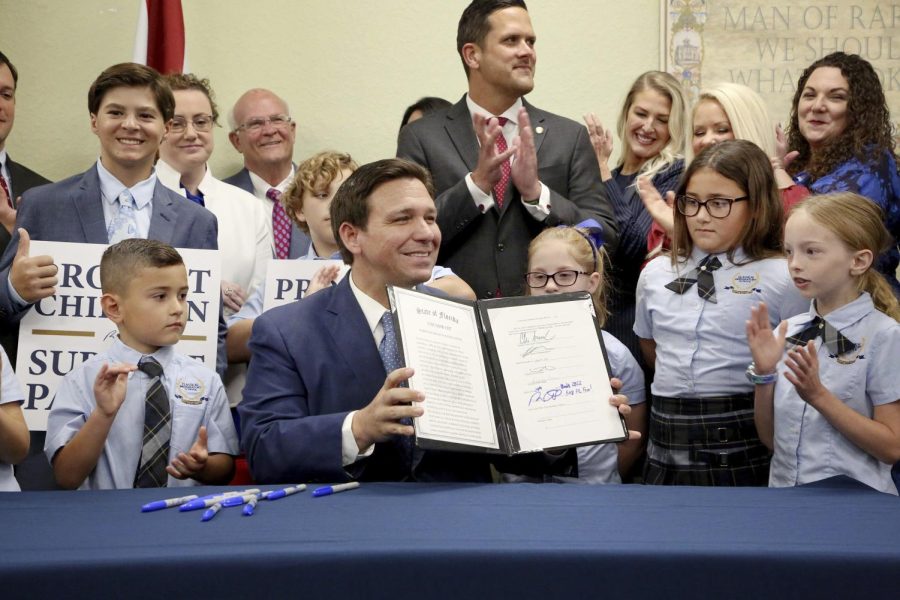The irony behind Ron DeSantis’ Don’t Say Gay bill
(Douglas R. Clifford/Tampa Bay Times via AP)
Florida Gov. Ron DeSantis displays the signed Parental Rights in Education, aka the Don’t Say Gay bill, flanked by elementary school students during a news conference on Monday, March 28, 2022, at Classical Preparatory school in Shady Hills.
Apr 7, 2022
On Mar. 28, 2022, Florida Gov. Ron DeSantis signed the infamous “Don’t Say Gay” bill into law. Despite the outrage in Florida and other states in the nation leading up to the imposition of the new law, DeSantis still approved the bill starting a new reign of bigotry in Florida.
Arguments have been made by citizens and officials alike attempting to decipher the bill both justifying and condemning its language. While at first, the law may not seem terrible, it is constricting for LGBTQIA+ youth growing up in Florida. The bill states that no instruction on sexual orientation or identity will be allowed in public schools until after the third-grade level. While this clause of the bill may seem fair to those who want to shelter children, the kicker is the following statement: “after the third grade, the conversations about sexuality must be age-appropriate.” A laissez-faire interpretation of the term “age-appropriate” by teachers may mean that sexual identity can never be discussed in the classroom.
Homophobic staff may choose to say that LGBTQIA+ rights are only “age-appropriate” in college and students are left without the proper education they need. The bill seems to be both extremely strict and extremely lenient; each in the exact spots that those in opposition to the gay community need it to be. Citizens are told exactly what words they can not say until a certain age because it is “inappropriate” but never have the obligation of using it for education when it is time.
To be fair, it seems the law’s culture is packed full of this kind of paradoxical behavior. Whether you are on the right side or left side of the political aisle, it is undeniable that one of the most peculiar aspects of the new bill is not exactly within its contents alone but how DeSantis announced his signing: at an event with young children. The school-aged children, many below the designated third-grade level, clapped as the governor proudly proclaimed his decision on the law. The children applauded him not knowing at all the implications of his actions on the hundreds of thousands of kids across the state.
It is ironic because DeSantis signed a bill banning the speech of gender identity and sexuality with students yet discussed the concept of this confining legislation openly with them as if the new law did not have the emotional impact it was based on. The ultimate irony of it all? The children he was talking to during his announcement, those representing the wave of “sanctity” in Florida schools, were from a private institution. As aforementioned, the bill only impacts public schools.
This publicity stunt begs the question: does DeSantis care about the youth of his state or is he only making certain moves for bonus points in his own party? He openly discussed the contents of the bill in front of children when the same topics are banned by the legislation. He also makes an example of the students surrounding him when they are in a school that is not impacted at all by this new law. In simple terms, DeSantis saw the children as a tool for political gain and utilized them like spare change.
Why should Floridians follow the rule of a man who claims to be wanting the best for children but then uses them as pawns in his own campaign? DeSantis’ actions illustrate just how two-faced and self-serving his politics can be; just like the Don’t Say Gay bill itself.














Deborah Coffey • Apr 18, 2023 at 1:20 pm
Well, it makes me wonder if Ron DeSantis is gay. So far, those in the Republican Party who have bashed the LGBTQ community the hardest, have turned out to be…well, gay.
jacqueline bullette • May 24, 2023 at 9:13 pm
How right u are